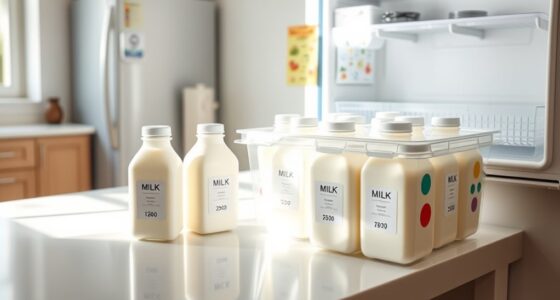Research indicates that it is recommended by the American Academy of Pediatrics to exclusively breastfeed or formula feed infants for the first six months of their lives.
Making the decision on when to stop formula feeding can be an important milestone for parents. Understanding the signs signaling readiness for this change is essential, but it's just the beginning of the journey.
Knowing the right time to introduce solid foods and navigate the shift from formula to whole milk are key aspects to think about.
So, when should parents start thinking about this significant change in their child's diet?
Key Takeaways
- Transition to solid foods around 12 months for nutritional variety.
- Gradually switch from formula to milk, consulting a healthcare provider.
- Consider toddler formula for tailored nutritional support during transition.
- Monitor weaning process, offer milk in a cup, seek pediatrician's guidance.
Signs of Readiness for Transition
When considering moving your baby off formula, it's important to be aware of the signs of readiness for this change. As parents, we understand how important it's to pay attention to our baby's cues. If your baby is showing interest in solid foods, sitting up on their own, and holding a cup, these may be indications that they're ready to stop formula feeding. Additionally, if your little one is steadily gaining weight and consuming a varied diet, it might be time to wean them off formula. Typically, babies who are at least 12 months old and in good health are generally ready to shift from formula to solid foods.
Watch out for cues like decreased interest in formula and increased enthusiasm for solid foods. Your baby's actions and reactions can guide you in knowing when the time is right to make this important switch. Trust your instincts as a parent and observe your baby closely to guarantee a smooth and successful shift away from formula.
Transitioning to Solid Foods

To guarantee your baby's smooth shift to solid foods, it's important to introduce them to new textures and flavors gradually, starting around 4-6 months of age to complement their milk intake. Here are some key points to consider when shifting to solid foods:
- Nutritional Variety: Solid foods provide essential nutrients and help babies explore different tastes and textures, contributing to a well-rounded diet.
- Consult Pediatrician: Seek guidance from your pediatrician to ensure a personalized approach that considers your baby's unique needs and development.
- Signs of Readiness: Look for signs like sitting up independently and showing interest in food to determine if your baby is ready to start solid foods.
- Complement Milk Intake: While introducing solid foods, continue formula feeding or breastfeeding to maintain the necessary nutrition until at least your baby's first birthday.
Timing for Switching From Formula
Shifting your baby from formula to cow's milk typically occurs around the age of 12 months as recommended by pediatricians. Waiting until this age guarantees that your baby's digestive system is ready for the switch to cow's milk, providing essential nutrients like vitamin D.
It's vital to wean your baby off breast milk or formula gradually when moving to cow's milk. By introducing cow's milk slowly, you can help your baby adjust to the new taste and the different nutrients it offers.
Remember, consulting with your child's healthcare provider is important for personalized guidance on when to stop formula feeding. The change from formula to cow's milk should align with the introduction of a varied diet to make sure your growing toddler receives all the necessary nutrients.
Starting the switch around 12 months is a good guideline, but individual babies may vary, so always seek advice from your healthcare provider to guarantee a smooth and healthy switch for your little one.
Toddler Formula Considerations

Considering the nutritional requirements of toddlers aged 12 months and older, toddler formula offers specific benefits to support their growth and development. When deciding whether to make the change, it's important to take into account your child's individual needs and consult a health professional for guidance.
- Nutritional Support: Toddler formulas are tailored to meet the needs of growing toddlers, providing essential nutrients like iron, calcium, and vitamins.
- Dietary Restrictions: If your toddler has specific dietary restrictions or needs additional nutritional support, toddler formula can be a suitable option.
- Consultation: Before switching to toddler formula, it's essential to consult with a pediatrician to make sure it aligns with your child's requirements.
- Change Period: While switching to whole milk is recommended for most toddlers after 12 months, toddler formula can be beneficial during this change period for some children.
Weaning Off Formula: Best Practices
Shifting your child from formula to cow's milk can be a gradual process that involves introducing regular cow's milk feeds while monitoring their response to the change. At around 12 months, you can start the shift by replacing one formula feeding with milk and slowly increasing the milk feeds over time. It's beneficial to offer milk in a cup to encourage independent drinking skills and help your child switch to cow's milk successfully. Babies may stop drinking formula more easily if they're also eating solid foods.
Monitoring your child's reaction to the shift is important. Some infants may need time to adjust to the new taste and digestibility of cow's milk. Remember to consult with your pediatrician for personalized guidance on the weaning process. Health organizations recommend weaning off infant formula and making the switch to cow's milk by the time your child is a year old. Making this change smoothly and patiently can help ensure a successful shift from bottle feeding to drinking milk from a cup.
Frequently Asked Questions
At What Point Do You Stop Giving Baby Formula?
When do we stop giving baby milk? Most babies can switch from milk to cow's milk around 12 months. Our pediatrician advised us to introduce solid foods and whole milk. Continuing milk feeding may not provide extra benefits.
When Should I Reduce Formula Feed?
When should we reduce formula feeding? We typically start decreasing formula feeds when our baby begins eating more solid foods. Around 9-12 months, we can gradually lessen formula feeds as our little one consumes more solids, eventually changing to cow's milk.
What Age Should You Switch From Formula to Milk?
We typically switch to cow's milk around our baby's first birthday. Whole milk is recommended for its essential fats. For toddlers with milk allergies, alternatives like soy or oat milk may be needed. Plant-based milks are not as nutritious as cow's milk for toddlers.
When Should You Throw Away Formula?
When should you throw away formula? It's important to discard any formula that's been at room temperature for over an hour. Remember, safety first! Keep your little one healthy by following these guidelines closely.
Conclusion
As parents, we grasp the importance of ensuring our babies receive the right nutrition at the right time. By following the signs of readiness, shifting to solids gradually, and consulting with our pediatricians, we can make the switch from formula to whole milk a smooth and successful process.
Remember, every baby is different, so trust your instincts and seek guidance when needed. Together, we can give our little ones the best start for a healthy future.









